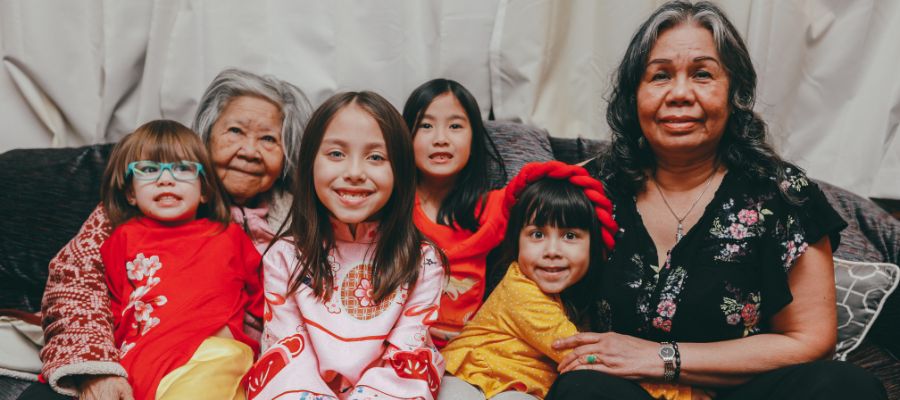Is your parent interview form culturally sensitive? Does it ask any questions that make assumptions? Does it ask any questions that are none of your business and don’t have an impact on speech and language skills? We set out to create a parent interview form that asked exactly the questions we need in the least biased and most culturally sensitive way possible. We started by collecting every parent interview form we could get our hands on and then we highlighted all of the questions we didn’t think we needed and reworded questions that were asked with leading assumptions. In short, we applied culturally sensitive communication to our interview process.
The Parent Interview Form Is Often Our First “Interaction” With a Family
The parent interview form is often our first interaction (of sorts) with the parents of children we might be evaluating. What we ask is important. As a parent of a child who has had dozens of evaluations in his life, I can tell you that it is frustrating when I am given forms that ask the same information multiple times, and questions that seem irrelevant to the process.

What Questions Did We Dump?
Let’s start with this one—”How old was the mother when she gave birth?”
Is this relevant? Do you know of any research that suggests that the age of the mother is related to speech and language disorders? I’m sure many of you are thinking about the higher prevalence of Down Syndrome in older mothers. True, but then wouldn’t a questions about whether the child has any diagnoses suffice?
Or how about this one: “Does your child initiate interactions with adults?” It’s clear that the author of this question wanted to understand something about the child’s social interactions but this question is loaded with cultural bias. In some cultures it is not appropriate for children to initiate interactions with adults. If the family answers this yes/no question as no, that might be a good thing in their eyes but a negative thing from the perspective of the interviewer. We can avoid problems by changing the style of our interviews, which we’ll talk about more below.
Does This Question Provide Valuable Information for the Speech-Language Assessment?
We’ve eliminated a bunch of questions we don’t really need to know the answers to. Our next step in the process is to gather more information from the parents in an interview. This is an important interview, as it gives us information to guide the steps we take in the evaluation process and it starts our relationship with the family. Start it in a good way and things will go more smoothly than if you don’t.
An Example of a Not-So-Good Parent Interview
Let me give you an example of an evaluation my son had that did not start off on a good foot. It was an Early Childhood program and it was conducted when my son was around 8 months old. There was a speech-language pathologist, a physical therapist, an occupational therapist and a service coordinator present at my house for the evaluation. We gathered in my living room and everyone got out there clipboards and started bombarding me with questions. One of the first questions went like this,
“So, Dad’s not involved?”
That was a question that one of the therapists ask me. There are a lot of assumptions in that question. First, that there is a dad. And that assumption was correct. Second, that dad is not involved. And that assumption was incorrect.
“Why is that your assumption?” I responded with big eyes.
“Well, he’s not here,” she said.
“It’s 10am on Wednesday and he is at work.”
So, how does my relationship start with this provider? Not well. No one likes to have assumptions made about them.
As clinicians, the way we interact with families is critical for forming connections with them. When clinicians use culturally sensitive communication, it promotes increased rapport, which leads to higher satisfaction, trust, and compliance with treatment.
What is Culturally Sensitive Communication?
Brooks and Bloomer (2018) provide a definition of culturally sensitive communication that includes the following components:
Culturally sensitive communication is…
- effective verbal and nonverbal interactions
- between individuals or groups,
- with a mutual understanding and respect of each other’s values, beliefs, preferences and culture,
- to promote equity in healthcare with the goals of providing optimal patient care.
What Does Culturally-Sensitive Communication Look Like in Practice?
One of the ways we implement culturally sensitive communication is through the use of the Ethnographic Interview.
History of the Ethnographic Interview
The Ethnographic Interview was made known by David Spradley, a professor of Anthropology at Macalaster College in St. Paul, Minnesota. He published the book, The Ethnographic Interview in 1979, among many other books on the topic during his career.
Carol Westby Applied the Ethnographic Interview to Speech-Language Pathology
Carol Westby and colleagues applied the Ethnographic Interview to the field of speech pathology to help SLPs ask the right questions in the right ways to facilitate rapport with families. This article is a quick read that is worth your time.
“The ways that questions are asked can either facilitate or disrupt the development of rapport… Introducing questions too quickly can turn interview into formal interrogations. Rapport will evaporate and informants may discontinue their cooperation.” Westby, Burda and Mehta, 2003
Interviews typically start with descriptive questions, such as, ““What is a typical day for you and your child?” As the parent responds, the evaluator:
- notes trends in the focus of the parent’s natural conversation
- pays attention to topics the parent introduces spontaneously
- asks for descriptions of everyday experiences, which helps them see the parent’s perspective during different situations.
- avoids paraphrasing and instead repeating the parent’s words when probing for more information.
Types of Questions in the Ethnographic Interview
There are several question types that are used in the ethnographic interview that start broad and get more specific. This allows the family to guide the topic of the interview rather than the interviewer. Interviewers practice using language that avoids assumptions. For example “Tell me how your child communicates” instead of “What problems does your child have with communication?” Ethnographic interviews are a good way to gather information about a family and their culture in a respectful way while not influencing or guiding the answers. Jenkins and Rojas created a great table with a summary of the types of questions used in the Ethnographic Interview process.
When we do this successfully, the interviewer’s job is more about listening and observing and less about asking direct questions, which decreases the incidence of guiding the answers.
Jenkins and Rojas, 2020 revisit the use of ethnographic interviews in the clinical setting. They discuss the Funds of Knowledge Framework, which is the resources and the knowledge that families use to get through each day. These “funds” could be strategies they use to help their child make himself understood. They could be physical resources that are used to support communication, nourishment, interactions, and more. The basic idea is that whatever tools are being used are valuable and meaningful to the family.
Gonzalez and colleagues, 2005, described Funds of Knowledge as “historically accumulated and culturally developed” strategies, skills, ideas and practices that help a household function. As clinicians, it is important for us to recognize that, even though sometimes these “funds” are foreign to us, they are valued by the family and their community, and should be respected.
As you approach your next interaction with a family in your practice as a speech-language pathologist, be mindful of the forms you ask them to complete and your interactions. Use culturally sensitive communication so you build rapport and strengthen your client’s clinical outcomes as a result. Place value on differences and respect them. Listen and don’t judge.
For more on this topic, see Building Relationships with Families to Maximize Clinical Outcomes



Wow, excellent job! Thanks for summarising, illustrating, and giving a boost to work.
Glad you liked it! More to come from this as we improve the evaluation process.
Is there a link to all of the interview questions that you use?
HI Bethany, it is something we are currently putting together. We conducted research this year on the best and most appropriate questions for parent, teacher, and health forms. We plan to release PDF versions soon. They are part of a new program we are creating to help write reports fast and accurately. Be on the lookout for those forms and he is what we are creating: http://www.evalubox.com
Great reminder! I just reviewed and updated my case history form based on this article. Thank you!
That’s really great. Glad you found it useful.